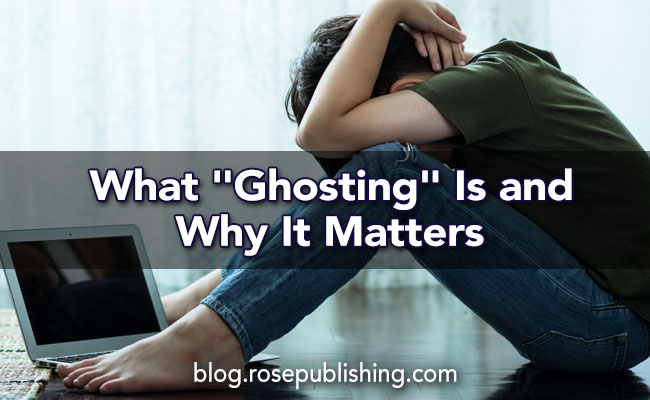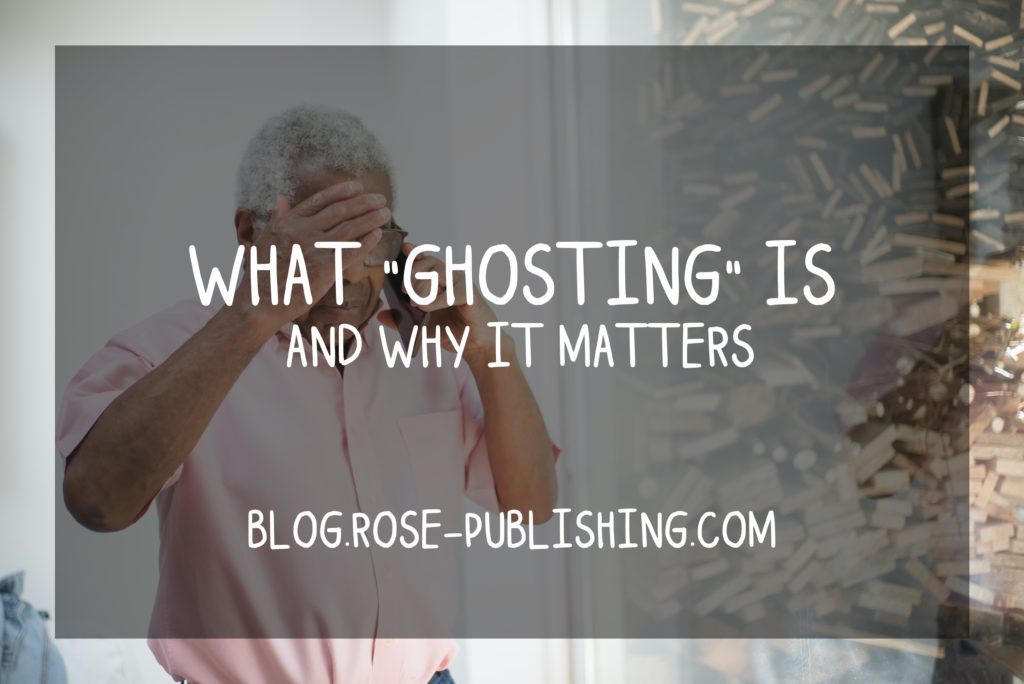
Even if you’re unfamiliar with the term ghosting, it’s likely you have also been a victim of ghosting at some point in your life, raising many questions and stirring strong feelings within you. It’s not fair that you’re silently left to pick up the pieces, wondering what happened and why. Ghosting hurts, and it casts a shadow of doubt and uncertainty upon your sense of self-worth.
Many people hear the word ghosted and think it pertains only to dating relationships—especially online dating, where it’s quick and easy to dismiss someone. And while the instances of ghosting have skyrocketed largely due to the prevalence of online dating sites and apps, the discussion here is much broader than romantic relationships. As you’ll see in the next chapter, ghosting can happen within friendships, families, workplaces, churches, and social groups. Sometimes friends ghost friends, family members ghost family members, coworkers ghost coworkers—on and on it goes.
Definitions and Statistics
Here are two definitions of ghosting that provide context for the discussion in this book:
- From Merriam-Webster.com: “the act or practice of abruptly cutting off all contact with someone (such as a former romantic partner) usually without explanation by no longer accepting or responding to phone calls, instant messages, etc.”
- From Psychology Today: “Ghosting is abruptly ending communication with someone without explanation. The concept most often refers to romantic relationships but can also described is appearances from friendships and the workplace.”
You can see from these brief definitions that ghosting covers a wide range of situations. I can confirm that it does, because over the past months I talked with many people about this topic. You will read some of their stories in this chapter and throughout the book.
If you also have your own ghosting story, you’ve got plenty of company, because the experience is becoming more and more common. In the results of one study published in 2019, approximately 72 percent of the men and women surveyed reported they had been ghosted in a romantic relationship, and 64 percent admitted to ghosting someone else. Ghosting in friendships may be even more common. More than a third of participants in another study reported they had ghosted a friend or had been ghosted by one. And not surprisingly, the majority of young people, who often utilize online dating, have experienced ghosting. One survey found that 78 percent of Millennials (ages 18–33) said they had been ghosted. Ghosting has also increased in the workplace and other business settings. In one survey, 40 percent of employers said it has become more common for job candidates to dropout of the interviewing process and cut off communication without explanation. On the flip side, 77 percent of job candidates who participated in a different survey reported they had been ghosted by a prospective employer.

The issue of ghosting is something else altogether. Ghosting almost always involves a choice to cut off contact and often includes “benign neglect” (not caring about the person being ghosted) or a mean-spirited attitude. Various other terms can describe ghosting as well:
- Shunning
- Snubbing
- Deserting
- Abandoning
- Rejecting
- Giving the silent treatment (for a long time)
- Leaving someone high and dry
It is a sad fact of life when valued relationships end and you don’t understand why. Ghosting is an insensitive act at best and purposefully damaging at worst. Learn how you can quickly identify signs of ghosting as well as what to do about (should you reach out?; what NOT to do if a ghoster tries to reconnect; and how to emotionally recover from ghosting) it in Here Today, Ghosted Tomorrow.
Did you enjoy this post? Learn more about ghosting, including how to heal from the pain of being ghosted from this book by Dr. Gregory Jantz!:
Here Today, Ghosted Tomorrow
Get the practical tools, psychology, and hope to deal with ghosting and the tumultuous emotions that follow in this easy-to-read handbook by Dr. Gregory Jantz! With Here Today, Ghosted Tomorrow, you will learn:
- What ghosting is and why it matters
- Why people “ghost” (and why it hurts so much)
- The 7 damaging effects of ghosting (betrayal, rejection, mental health issues, and more)
- How to regain hope and heal any pain and abandonment
Was it something I said? What did I do wrong? How can I fix this? If a friend or loved one has ever ghosted you, the pain can sting like deep wound. But you can overcome this grief, even without the closure you might think you need. Enjoy having:
- Real, relatable stories
- Definitions, statistics, and easy-to-understand summaries
- Tried and tested psychological and spiritual advice
- Encouraging scriptures to heal
Has someone in your life cut off all communication with you, abruptly and without explanation, leaving you feeling hurt, abandoned, and perplexed? Without a word, they just stopped responding to your phone calls or texts? Maybe you’ve been blocked on social media or no longer see them at church or the office? Ghosting hurts, and it casts a showdown of doubt and uncertainty upon your sense of self-worth. But there’s hope in resilience and healing.
Get Practical Advice on What To Do If You’ve Been Ghosted
Featuring helpful checklists and research in an easy-to-read format, Jantz’s Here Today, Ghosted Tomorrow doesn’t just give you basic, one-size-fits-all explanations. This handy resource gives you detailed, step-by-step tools and encouragement to grow stronger and more resilient in your current and future relationships. Gain practical tips like:
- 10 ways to deal with rejection
- What to do if a ghoster reappears in your life (what to say, and how to protect yourself)
- How to evaluate whether or not you should reconnect
- Know if there are ever healthy reasons to ghost someone
- And more!
Enjoy Having the Tools to Grow and Become More Resilient
You don’t have to just move from one toxic relationship to another! You can gain the skills and tools to find friendships that are healthy, nurturing, and positive. When you leave the negativity behind, you will also be equipped with simple tools to build safe and trusted relationships built on mutual support. Some of these tools include:
- 5 steps to recover from a toxic relationship
- 10 signs someone has a good heart
- 7 ways to invest in health relationships
- And more!
Are you ready to renew your hope and confidence as you look forward to enjoying healthy relationships in the future? Get started with Dr. Jantz’s Here Today, Ghosted Tomorrow.
Here Today, Ghosted Tomorrow is perfect for individual and group use. Great for counseling, discipleship, singles groups, small groups, church giveaways, and more!



